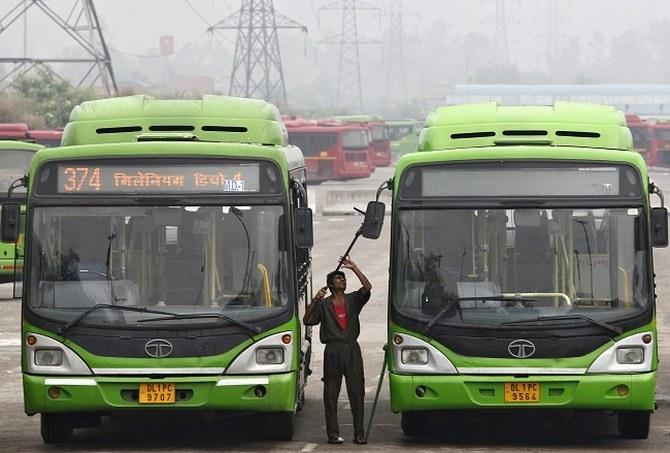Low Wages and Exploitation: DTC Workers Call ‘Strike Ballot’

Taking their protest to another level, Delhi Transport Corporation (DTC) workers have given a call for a strike ballot, wherein workers will vote for or against a strike in DTC. The voting will start from September 25 and will continue till 28. Recently, DTC had reduced the wages of contractual workers – including drivers and conductors – following a high court order which had quashed a March 2017 notification of revising the minimum wages for unskilled, semi-skilled and skilled workers in the city, citing it as “ultra vires Article 14” of Constitution of India. Following the judgement, DTC had passed a circular according to which it had decided to pay minimum wages to its workers.
The circular read, “Pending receipt of the orders from GNCTD on the subject, it has now been decided by the DTC to pay the minimum rates of wages to its workmen/ contractual employees as per the following formula: Last minimum wages paid to all class of workmen/employees before issuance of GNCTD’s notification dated 3.3.2017 which was effective from 1.10.2016 plus two DA applicable w.e.f. 1.4.2017 & 1.4.2018.” Since then, the disgruntled workers have been protesting against the DTC’s circular, but now they have decided for a strike ballot.
Also read: Why are AAP and DTC Silent over the Demands of Contractual Workers?
“This is probably the first time that workers are going for a strike ballot in DTC. The last strike action took place in 1989 – since then there has been no strike in DTC. Workers will vote for or against the strike. If majority of votes are for the strike, then the union will go for a strike,” said Abhishek, General Secretary, AICCTU, Delhi. The strike will be in the backdrop of three major demands. “Three major demands have been raised by the workers - Equal Pay for equal work, taking back the circular on the reduction of salary and no to private buses in DTC,” added Abhishek.
As per the workers, they have been suffering because of the private buses. “See, private buses have their own staff – conductors and drivers. Our work is undermined that way. We don’t have a problem with private buses but with their private staff. When we are working here, why should they have their own staff. That is the basic question. We are being exploited by DTC,” Rajesh, a DTC worker told NewsClick. Meanwhile, workers are campaigning for the strike and appealing all the workers to come together and fight for their rights.
Sources revealed that the DTC has been planning to recover the bonus and the “hike” they had given to workers. “We just got to know that our hike and bonus will be recovered from our salary. It’s sad. The high court didn’t ask them to recover previous payments. Why are they doing this to poor people like us? After the circular by the DTC, the contractual driver’s salary has been reduced by Rs. 10,000 and the contractual conductor’s salary by Rs. 6,000. The saddest part is that nobody came to listen to our grievances. They haven’t even acknowledged the problems,” Naresh, a contractual driver, who has been working for 13 years, had told NewsClick on an earlier instance.
The contractual workers have been demanding an end to this discrimination faced by them. They believe that they should get paid equally for the same work hours (and sometimes more) as permanent workers. “We want DTC to quash the circular and provide us with our previous salaries. Also, we want equal pay for equal work. Why should we be paid less for working equally as the permanent workers, specially when the nature of the job is the same,” said Rajesh.
The workers have been demanding the implementation of Section 25 in the Contract Labour (Regulation and Abolition) Central Rules, 1971, according to which, in cases where the workman employed by the contractor perform the same or similar kind of work as the workmen directly employed by the principal employer of the establishment, the wage rates, holidays, hours of work, and other conditions of service of the workmen of the contractor shall be the same as applicable to the workmen directly employed by the principal employer of the establishment on the same or similar kind of work.
Get the latest reports & analysis with people's perspective on Protests, movements & deep analytical videos, discussions of the current affairs in your Telegram app. Subscribe to NewsClick's Telegram channel & get Real-Time updates on stories, as they get published on our website.
























